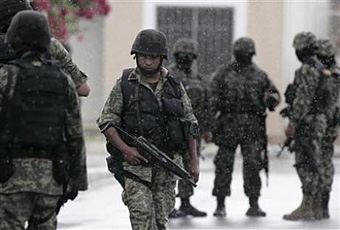
|  |  |  News Around the Republic of Mexico News Around the Republic of Mexico  
Lawmakers Block Mexico's Crucial Drug War Reforms
 Miguel Angel Gutierrez & Mica Rosenberg - Reuters Miguel Angel Gutierrez & Mica Rosenberg - Reuters
go to original
November 20, 2010


| | Soldiers stand in the rain during a raid on a house in a residential neighborhood in Cancun November 18, 2010. (Reuters/Gerardo Garcia) |  |
Mexico City - Mexico's divided Congress is unlikely to pass President Felipe Calderon's pivotal plans to reform the police and combat money laundering, risking a major setback in the war against violent drug cartels.

The conservative president is under rising pressure from investors, the United States and fearful Mexicans to contain a conflict that has killed more than 31,000 people in the last four years.

But squabbling in Congress and opposition within his own ruling National Action Party (PAN) are stalling the initiatives Calderon says are crucial to fighting organized crime.

Amid jockeying before elections in 2012 and disputes over political alliances, Calderon appears unable to forge enough support and, at best, will see his plans heavily watered down.

"There is no consensus among lawmakers, not even within the PAN. There is a lot of opposition to the proposal for a unified police command," PAN Senator Alejandro Gonzalez, who heads the Senate's justice committee, told Reuters.

The stalled reforms are part of a larger problem hindering Mexico's transition from 71 years of one-party rule since the PAN won the presidency from the Institutional Revolutionary Party (PRI) in 2000.

"The Mexican Congress has used its newly acquired power not to push through modernizing reforms but rather to control and thwart the executive at every turn," said political analyst Denise Dresser.

Legislative gridlock is proving a major barrier to Latin America's No. 2 economy. The ruling party's proposals for economic reforms, including new labor laws and anti-monopoly regulations, are also stalled in Congress. The lack of reform is hindering Mexico as other Latin American nations, like Brazil and Chile, take off.

"THE KEY TO OUR BATTLE"

Calderon wants to bring ill-equipped and notoriously corrupt municipal police forces under the control of Mexico's 32 state governors, ending a dysfunctional system of 2,200 different jurisdictions across the country.

But critics say the measure would concentrate too much power in the hands of poorly run state governments. "One of the principal reasons driving crime and violence in the country is governors not doing their job," Gonzalez said.

Many local jurisdictions have been infiltrated by the cartels who are fighting security forces while battling each other for control of smuggling routes for marijuana, cocaine, methamphetamine and other drugs into the United States. Weapons and cash flow back across the border into Mexico.

In August, Calderon proposed a revision to several laws in an effort to hinder cartels from funneling up to $40 billion a year in drug revenues through the Mexican financial system.

"The goal is to hit the criminals where it hurts most, on the economic front," Calderon said on Thursday, adding that the money laundering initiative and the unified police command "are the key to our battle for security."

His plan to go after the proceeds of the drug trade has more support but still faces serious hurdles.

"The president introduced this initiative with a lot of force but it got stuck in the Senate," Jose Trejo, the PAN senator who heads the finance committee, told Reuters. "If it passes, it will only be with various changes. It will be complicated in this session."

Congress will recess on December 15 and both reforms are not expected to fare much better when it reconvenes next year.

The PRI, the main opposition party, is key to passing any of Calderon's plans. But the PRI and the leftist Party of the Democratic Revolution are loathe to hand the president any policy victories ahead of the 2012 elections.

Calderon has staked his presidency on fighting drug traffickers, deploying the army and federal police across the country after taking office in late 2006.

But worsening violence - including beheadings, car bombs, assassinations of politicians, kidnapping and extortion - is spooking business people and tourists and could force more companies to scale back investment.

(Editing by Christopher Wilson)
|

 |
|  |



